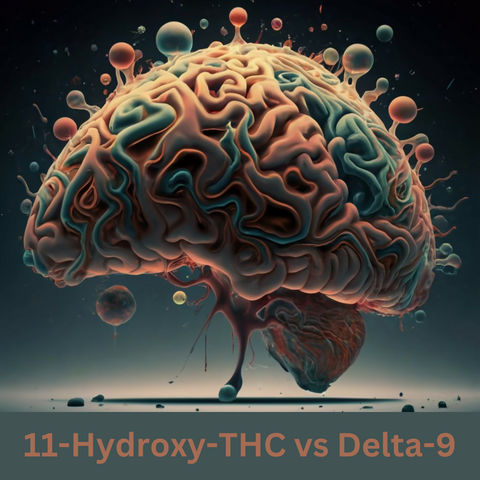If you're a cannabis enthusiast, you've likely heard of delta-9 THC—the primary psychoactive compound responsible for the "high" associated with marijuana use. But have you ever wondered about its cousin, 11-hydroxy-THC, and how it compares? In this article, we'll delve into the differences between these two cannabinoids, exploring their effects, potency, and more.
Delta-9 THC: The Classic High
Let's start with delta 9 THC (tetrahydrocannabinol thc), the well-known psychoactive component of cannabis. When you smoke, vape, or ingest THC through edibles, it binds to the CB1 receptors in your brain, triggering a range of effects. Cannabis users often report feeling intense euphoria, relaxed, and sometimes even creative or introspective.
11-Hydroxy-THC: The Underdog
Now, let's shine a light on 11-hydroxy-THC, which isn't as famous but plays a crucial role in how our bodies process THC. When you consume THC through edibles, your liver metabolizes it into 11-hydroxy-THC. This metabolite is particularly potent and crosses the blood-brain barrier more effectively than delta-9 THC, leading to intense effects and longer lasting effects.
Potency and Duration
One of the key differences between these two cannabinoids is potency and duration of effects. While delta-9 THC delivers a quick onset of euphoria and typically peaks within 30 minutes to an hour, 11-hydroxy-THC takes longer to kick in—often up to two hours. However, once it does, its effects can be more intense and longer-lasting, providing users with a prolonged experience of euphoria and relaxation.
Feeling the Effects: Delta-9 vs 11-Hydroxy
If you've ever consumed THC in different forms, you may have noticed variations in how you feel. Smoking or vaping cannabis tends to produce a more immediate and short-lived high, whereas consuming edibles can result in a slower onset but a more pronounced and enduring experience meaning one will feel high. This is due to the conversion of delta-9 THC into 11-hydroxy-THC during the digestion process.
11-Hydroxy-THC and Drug Tests
Another important consideration for cannabis users is how these cannabinoids interact with drug tests. While standard drug tests typically screen for delta-9 THC, they may not detect 11-hydroxy-THC as readily. However, it's essential to note that everyone's metabolism is different, and individual factors such as frequency of use, body fat percentage, and hydration levels can influence detection times.
Stronger Than Delta-9 THC?

Some users claim that 11-hydroxy-THC is stronger than delta-9 THC coming from the cannabis plant, citing its more intense euphoric effects and longer duration. However, potency is subjective and can vary depending on factors such as dosage, tolerance, and individual biochemistry. What's important is to understand how each cannabinoid affects you personally and to consume responsibly.
Hemp-Derived Cannabinoids and CB1 Receptors
While delta-9 THC is primarily associated with marijuana, hemp-derived cannabinoids such as CBD also interact with the body's endocannabinoid system, albeit in different ways. Unlike THC, CBD doesn't directly bind to CB1 receptors and doesn't produce psychoactive effects. Instead, it modulates the activity of these receptors, potentially influencing mood, pain perception, and more.
Navigating the Cannabis Landscape
As the popularity of cannabis products continues to grow, it's essential for consumers to educate themselves about the various cannabinoids and their effects. Whether you prefer the immediate high of delta-9 THC or the prolonged experience of 11-hydroxy-THC, understanding how these compounds interact with your body can help you make informed choices and enhance your overall cannabis experience.
Unlocking the Mystery: How Your Metabolism Shapes Your Cannabis Experience
Have you ever wondered why two people can consume the same amount of cannabis and have vastly different experiences? It all comes down to metabolism—the complex process by which our bodies break down and process substances like delta-9 THC, the primary psychoactive compound in cannabis. In this article, we'll explore how individual differences in metabolism can impact the conversion of delta-9 THC to its potent metabolite, 11-hydroxy-THC, and how factors such as genetics, age, and liver function play a role in shaping your cannabis experience.
Genetics:
Genetics play a significant role in how our bodies metabolize cannabinoids like delta-9 THC. Certain genetic variations can affect the activity of enzymes responsible for breaking down THC in the liver, potentially leading to differences in the rate of conversion to 11-hydroxy-THC. For example, variations in genes coding for cytochrome P450 enzymes, which are involved in drug metabolism, can influence individual responses to cannabis.
Age:
Age is another factor that can impact cannabis metabolism. As we age, our metabolism naturally slows down, affecting the rate at which our bodies process and eliminate substances like THC. This can lead to differences in the onset and duration of effects, with older individuals potentially experiencing a slower onset and longer-lasting effects compared to younger users.
Liver Function:
The liver plays a crucial role in metabolizing delta-9 THC into 11-hydroxy-THC. Factors that affect liver function, such as liver disease or certain medications, can impact this process and alter the intensity and duration of cannabis effects. Additionally, individuals with liver conditions may metabolize THC more slowly, leading to higher levels of THC and its metabolites circulating in the bloodstream.
Metabolism and individual variability play a significant role in shaping the cannabis experience. Factors such as genetics, age, and liver function can influence how quickly our bodies metabolize delta-9 THC and its conversion to 11-hydroxy-THC, ultimately impacting the onset and intensity of effects. By understanding these factors, cannabis users can better tailor their consumption habits and maximize the benefits of this fascinating plant.
Conclusion
In the world of cannabinoids, delta-9 THC and 11-hydroxy-THC stand out for their unique effects and properties. While delta-9 THC is the classic psychoactive compound associated with marijuana, 11-hydroxy-THC offers a slower onset and potentially more intense experience, especially when consumed through edibles. By understanding the differences between these two cannabinoids, cannabis users can navigate the landscape more confidently and responsibly, maximizing the benefits and minimizing potential risks. So whether you're feeling the effects of delta-9 or exploring the potency of 11-hydroxy, remember to consume mindfully and enjoy the ride.
